Fruit News
Research conducted in US claims to show that switching to an organic diet could improve sperm quality and quantity
Pesticides on fruit and veg could be harming sperm counts, new research has suggested.
The team from Harvard University in the USA suggested that men should consider going organic if they want to have children, as, although their research wasn’t conclusive, they believe produce containing high levels of pesticides may be having a damaging impact on semen quality and quantity.
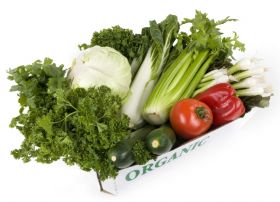
The study found that men who ate at least one and half portions of fruit and vegetables containing high levels of pesticide residue had sperm counts which were 49% lower than usual. Their semen quality was also reduced by 32%.
Those who ate large quantities of fruit and vegetables with little or no residue saw their sperm quality increase by 37%.
The researchers stated: “These findings should not discourage the consumption of fruit and vegetables in general. In fact, we found that total intake of fruit and vegetables was completely unrelated to semen quality.
The team analysed 338 semen samples from 155 men aged between 18 and 55 attending a fertility centre between 2007 and 2012.
The men’s diet was assessed by a questionnaire, and they were asked how often, on average, they had consumed how many portions of fruit and vegetables, using standard portion sizes such as one apple, or half an avocado.
The study took account of usual practice in food preparation, such as whether the fruit and vegetables had been peeled and washed.
The researchers divided the men into four groups, ranging from those who ate the greatest amount of fruit and vegetables high in pesticides residue (1.5 servings or more a day), to those who ate the least amount (less than half a serving a day).
They also looked at men who ate fruit and vegetables with low-to-moderate pesticide residues.
The group of men with the highest intake of pesticide-heavy fruit and vegetables had an average total sperm count of 86 million sperm per ejaculate compared to men eating the least, who had an average of 171 million sperm per ejaculate – a 49% reduction.
The research was published in the journal Human Reproduction.
Kent-based strawberry and pear farmer will be representing the interests of all growers in the south-east region

David Long has joined the NFU’s horticulture and potatoes board.
Long runs DG Long, a 1,500-acre family-owned farm near Rochester, Kent, producing pears and strawberries, among other crops.
Long has overseen an expansion of the business in the last decade which has focused on the planting of new pear orchards.
NFU horticulture adviser, Chris Hartfield, commented: “The NFU would like to congratulate David on his appointment to the national horticulture and potatoes board. We have no doubt that his experience in growing pears and strawberries will make his input invaluable to the challenges we face as a sector.
“As well as representing the interests of fruit growers, David will also be representing the interests of all growers in the south-east region.”
Latest ONS shopping basket used to assess inflation in the UK economy includes maiden appearances for exotic produce
Sweet potatoes and melons have been added to the shopping basket used to measure UK inflation, with items such as sat navs and yoghurt drinks being removed to make room.
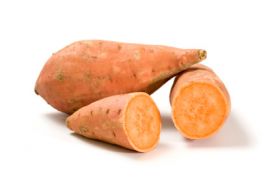
The Office for National Statistics (ONS) updates its basket of goods and services every year to keep pace with trends and changing spending habits, meaning joining the exotic fruit and vegetable on the list this year are e-cigarettes, headphones and music streaming subscriptions.
Other additions include chilled pizza, which replaces frozen pizza, as spending on chilled pizzas has risen above spending on the frozen alternative.
The inflation basket dates back almost 70 years, and now includes 703 goods and services.
Using the shopping basket, the ONS collects over 100,000 individual prices each month from 20,000 shops across the UK, as well as a further 70,000 prices online to assess how fast prices are rising and falling.
It then uses weights for each item – their relative importance in calculating inflation – based on survey evidence of people’s spending, and comes up with an inflation number for the whole economy.
The latest data showed inflation at a record low of 0.3% on the consumer price index measure.
First British strawberries are available a week earlier than usual, with growers on the outskirts of Cardiff one step ahead of the rest
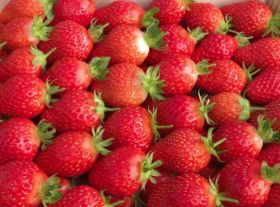
As a result of a generally mild winter; growers have produced the first British strawberries – a week earlier than usual.
These berries, on their way to retailers such as Tesco across the UK, also mark the first time ever that Wales has successfully produced the UK’s earliest strawberries, ahead of the likes of Kent, Sussex and Hampshire.
The variety of these early season Welsh-grown strawberries, grown in the Rhymney Valley, near Cardiff, is called ‘Driscoll’s Lusa’ and have been selected because of their consistent, sweet taste.
Proposed deal could create world’s largest fresh produce company and adds development to recent rumours of a possible sale
The directors of Belgium-based fruit and vegetable giant Univeg have revealed they are to discuss a potential merger with processing firm Greenyard Foods and horticultural substrate specialist Peatinvest, a move that would create the world’s largest fresh produce company.
Greenyard Foods, which changed its name in September 2013 from PinguinLutosa after the sale of its Lutosa potato business to McCains, is currently listed on the Euronext stock exchange, so the move will add further fuel to rumours circulating last month that plans are afoot to take Univeg public.

In February, Belgian newspaper De Standaard claimed that Univeg’s chairman and majority shareholder Hein Deprez wanted to sell the company in an initial public offering during the second half of 2015.
In a statement, the company’s board said it believed a “business combination” of the three groups had the potential to create “a unique global player in the fruit and vegetables market capable of offering the full range of fresh, frozen and canned products”.
Combining Univeg with Greenyard Foods and Peatinvest would in theory create a global market leader in the fruit and vegetable business, with combined revenue in excess of €3.7bn eclipsing the sales of even the largest multinationals currently operating in the business.
Hein Deprez, chairman of Univeg, is also chairman of Greenyard Foods and Peatinvest – both of which have their headquarters in Belgium.
At Greenyard, via Deprez Holding, Food Invest International and 2D, he is also the controlling shareholder of the company, with around 46 per cent ownership. He is also the major shareholder in Peatinvest.
Commenting on the proposed merger, Deprez commented: “Creating a combined group offering fresh, frozen and canned fruit and vegetables would be beneficial to growers, retailers, consumer, employees and shareholders. We believe societal trends call for a more holistic view on fruit and vegetable consumption.”
Univeg’s statement added that discussions were still due to take place regarding the value and specific detail of any such deal. No decision will be made until an agreement has been reached!
“No final decision has been reached regarding the structure of any business combination,” the group added. “In the meantime, there can be no certainty on any agreement between Univeg, Greenyard Foods or Peatinvest, or as to the terms of any such agreement.”
The £8m brand is bringing cartons of ‘Sweet Greens’, ‘Sunshine Blend’ and ‘Radiant Roots’ to the growing health juice market
Following significant market growth in the vegetable juice market and the success of its own ‘Brilliant Beetroot’ blend, Cawston Press is launching three new vegetable and fruit drinks.
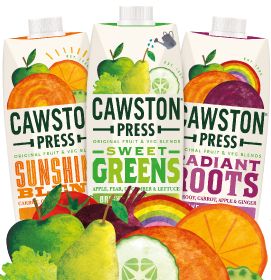
The £8 million retail sales brand is bringing 750ml Tetrapak cartons of ‘Sweet Greens’, ‘Sunshine Blend’ and ‘Radiant Roots’ to the market.
They are initially going to be stocked in Tesco’s chilled cabinets, a retail first for the previously-exclusively ambient brand, with further multiples and independent stores planned.
The drinks contain nothing but pressed fruit and veg, and given how the juice market is growing, Cawston is expecting “great things” with these products.
According to Nielsen Scantrack (for the year ending 3 September, 2014), the volume of the pure and mixed vegetable juice category is up 6.6% year-on-year (16.5 million litres), while its value is now £27.2m, up by 11.5%.
The distinctive recipes are inspired by juice bar culture and the fresh ingredients found in kitchen gardens. The balance of each flavour presented blending challenges – just finding the perfect mint for ‘Sweet Greens’ proved hard, as Cawston wanted to replicate the gentle ‘grassy freshness’ of mint from a garden, rather than the harsh mint used in chewing gum and chocolate.
John Mulvey, Cawston’s marketing manager, said: “There’s a clear trend towards healthier, natural drinks that these are well-positioned to take advantage of. This has left consumers open to new drink concepts, including the re-appraisal of ingredients such as vegetables, which were previously seen as niche.
“We’ve re-imagined veg and fruit juice, combining vibrant branding and exciting blends which capture the juice bar spirit in a convenient and accessible way. 2014 saw the business grow by over 60%, and we’re confident these products will play a big part in recruiting new customers to our brand.”
‘Potatokens’ on packs of branded All Rounder and Jacket Potatoes will be redeemed for potato preparation equipment
Potato supplier Greenvale is launching a loyalty campaign that allows shoppers to exchange ‘potatokens’ for potato preparation or kitchen equipment.
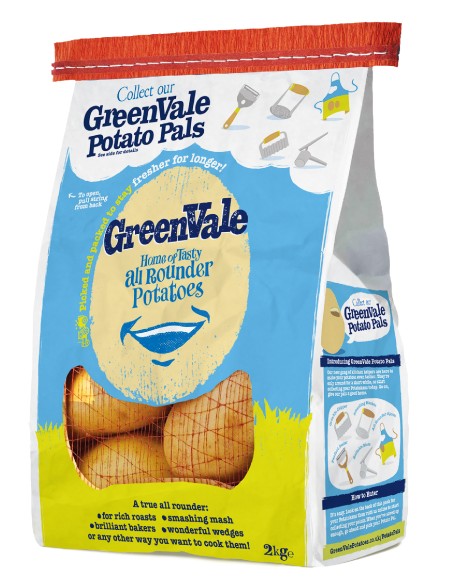
The ‘Potato Pal’ loyalty scheme, set to run at Tesco, Booths and Ocado, aims to boost sales of GreenVale All Rounder and Jacket Potatoes.
The on-pack tokens are in the form of unique codes and, once collected, must be registered on the company website, where accumulated points are redeemed for products including mashers, chippers, ricers and peelers.
Greenvale said it expects to reach more than 12 million shoppers, and will maintain belief and enthusiasm for the promotion by encouraging participants to post on social media, weekly prize draws, emails, recipes and ‘potato tips’.
Tracey Mattock, Greenvale’s marketing manager said direct communication with shoppers is a new venture for the business.
“We are extremely excited about the potential the Potato Pal scheme holds not only in terms of increasing awareness, trial and purchase of our branded potatoes, but also as an fun and attractive format to extend our social media presence.”
The scheme officially launches to consumers in the March edition of Tesco Magazine – where 10 starter points will encourage initial sign up – and will be promoted from 20 February.
Arctic comes in from the cold after US prepares to grant OSF licence to grow non-browning Golden Delicious and Granny Smith
The world’s first genetically modified apples will be grown commercially in the US for the first time following a decision by the US Department of Agriculture to approve two non-browning versions of Golden Delicious and Granny Smith for large-scale planting.
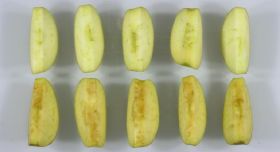
The varieties, which were developed using biotechnology by Canadian group Okanagan Specialty Fruits (OSF), will be marketed under the Arctic brand are likely to be on the market in 2016, according to the company’s president Neal Carter.
It is expected that the USDA’s Animal and Plant Health Inspection Service will publish its final environmental assessment and plant pest risk assessment shortly.
“This milestone is nearly two decades in the making, as Arctic Golden and Arctic Granny apples represent OSF’s first products since our inception in 1996,” Carter commented.
“We’re very excited for everyone who touches apples to experience the benefits of non-browning apples, and encourage you to read about the significant value they offer to growers, packers, fresh-cut and traditional processors, foodservice, retailers, and most of all, consumers.”
He added that the supply chain should feel confident that Arctic apples, which OSF says are identical to their conventional equivalents besides the fact they do not brown when cut, were probably “the most tested apples in existence”.
“All evaluations reach the same conclusion,” he said, “Arctic apples present no unique risks and are just as safe and healthful as any other apple.”
But it’s also true that the Arctic series has faced stiff opposition, not least from the Organic Consumers Association (OCA), which argued against granting approval on the grounds that genetic changes to prevent browning could adversely affect human health, while suggesting that pesticide residue levels on the apples might also be higher than otherwise necessary.
“This whole thing is just another big experiment on humans for no good reason,” said OCA director Ronnie Cummins.
Five years ago, OSF applied for non-regulated status for the two varieties and, since then, has been working to find potential commercial partners, including processors and growers, to bring the Arctic apples to market once regulatory approval was granted.
In 2012, the USDA’s Animal and Plant Health Inspection Service opened a 60-day review period for members of the public to offer comment on two non-browning apple varieties, Arctic Golden and Arctic Granny.
Later that year, Carter used a speech at a TEDx event in Canada to deliver an impassioned defence of agricultural biotechnology.
Pipfruit New Zealand has predicted an apple and pear season characteristic by high quality
The forecast of a lighter and later crop has failed to diminish the hopes of the New Zealand pipfruit industry heading into the 2015 season.
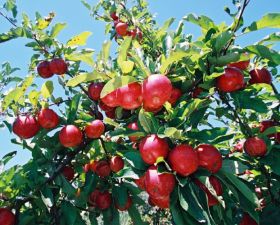
A report released by peak body Pipfruit New Zealand indicated the country’s total apple and pear production would be around 551,102 tonnes this year, down 6% on 2014.
Hail storms that swept across the country during late Spring took their toll on crops in key growing regions such as Hawkes Bay, Nelson and Central Otago, however, a warm start to summer seems to have been a saviour for the industry, with fruit quality now shaping up well.
“Every growing region has had an exceptionally warm mid-summer, which has meant apples have developed a well-rounded sweetness, fresh crispness and lovely vibrant colour,” said Pipfruit NZ business development manager Gary Jones. “Continual monitoring and grooming of the crop has resulted in tasty, crunchy, ready-to-eat fruit.”
The total export crop is estimated at 297,000 tonnes, down from 308,000 tonnes in 2014. Bruce Beaton, Turners & Growers’ (T&G) general manager of New Zealand pipfruit, said the season was running up to 10 days late, although he didn’t envisage this to cause a significant disruption to the global trade.
“The US and Europe have both had big crops, so there is still going to be fruit around when we enter the market,” Beaton told Asiafruit at Fruit Logistica in Berlin last week. “In terms of fruit quality, our New Zealand crops are looking excellent, particularly our Royal Gala, so I’m sure there will be plenty of demand when we begin shipping.”
Like the majority of the New Zealand industry, Beaton said T&G would continue to build its presence in Asia and the Middle East, while continuing to maintain a solid supply stream into Europe.
China looms as a cornerstone of the Asian expansion, although developing a share of the market has not been without its challenges. New Zealand’s Ministry of Primary Industries voluntary suspended apple exports to the People’s Republic in September 2013, after rot was found in a number of consignments. With shipments cleared to resume in time for the beginning of the 2014 season, both growers and exporters now seem intent on doing everything in their power to retain market access.
“China has shown that they have a zero tolerance for black spot so we are doing a lot of work in the field and packing sheds to prevent an outbreak,” Beaton said. ”It is a very good market, with more than enough customers for the New Zealand industry to supply.”
Jones said New Zealand’s commitment to food safety and it’s reputation as a high-quality producer continued to be key selling point. “This year, there has also been a listeria outbreak in apples distributed by a US grower, that has resulted in safety concerns against many importers, particularly in Asia,” said Jones. “With New Zealand commanding the most stringent food safety system in the world and traceability right down to blocks of trees within orchards, we’re expecting interest in our apples to be even higher than usual.”